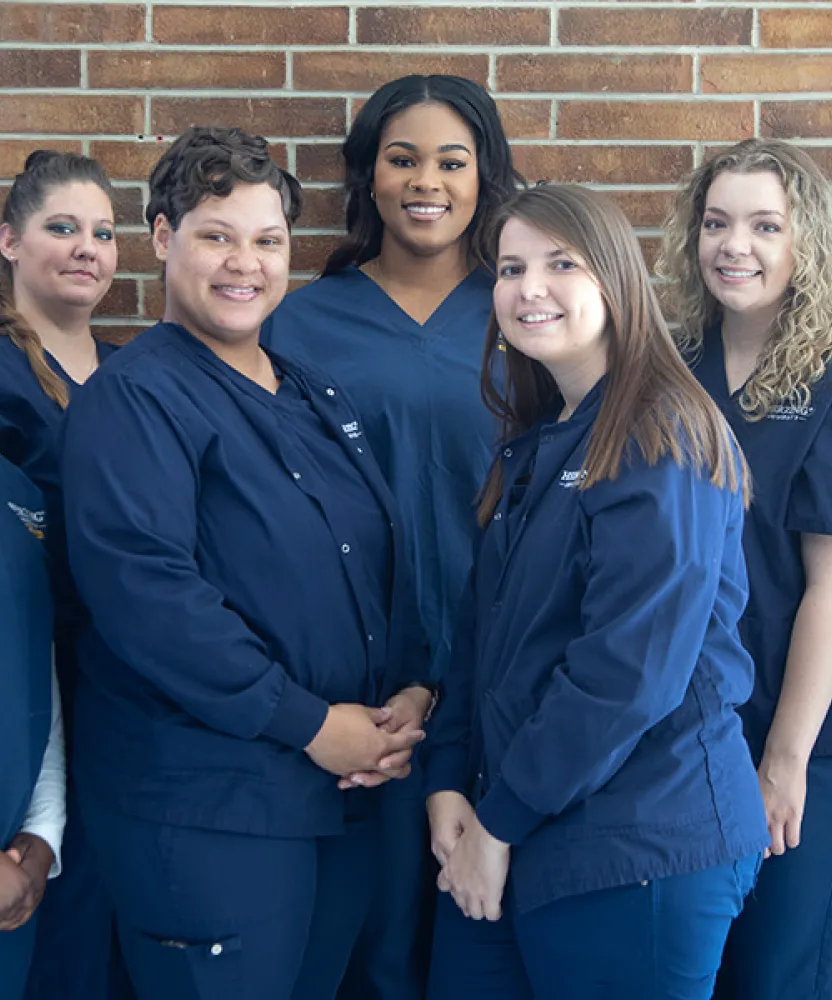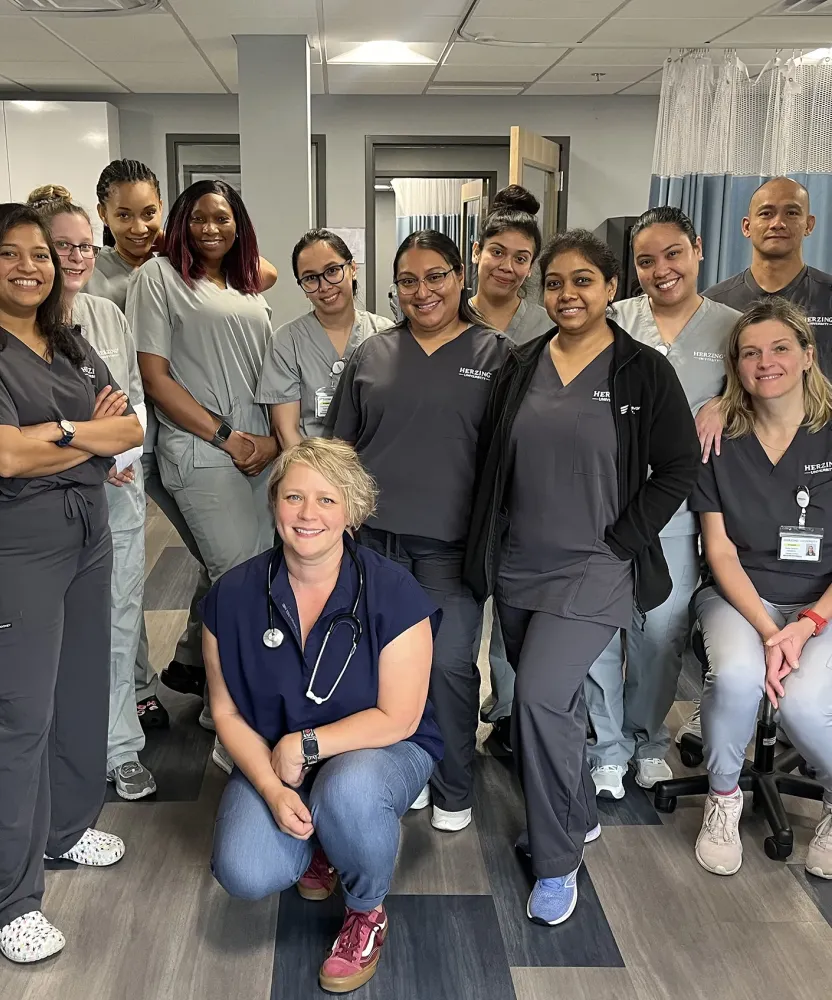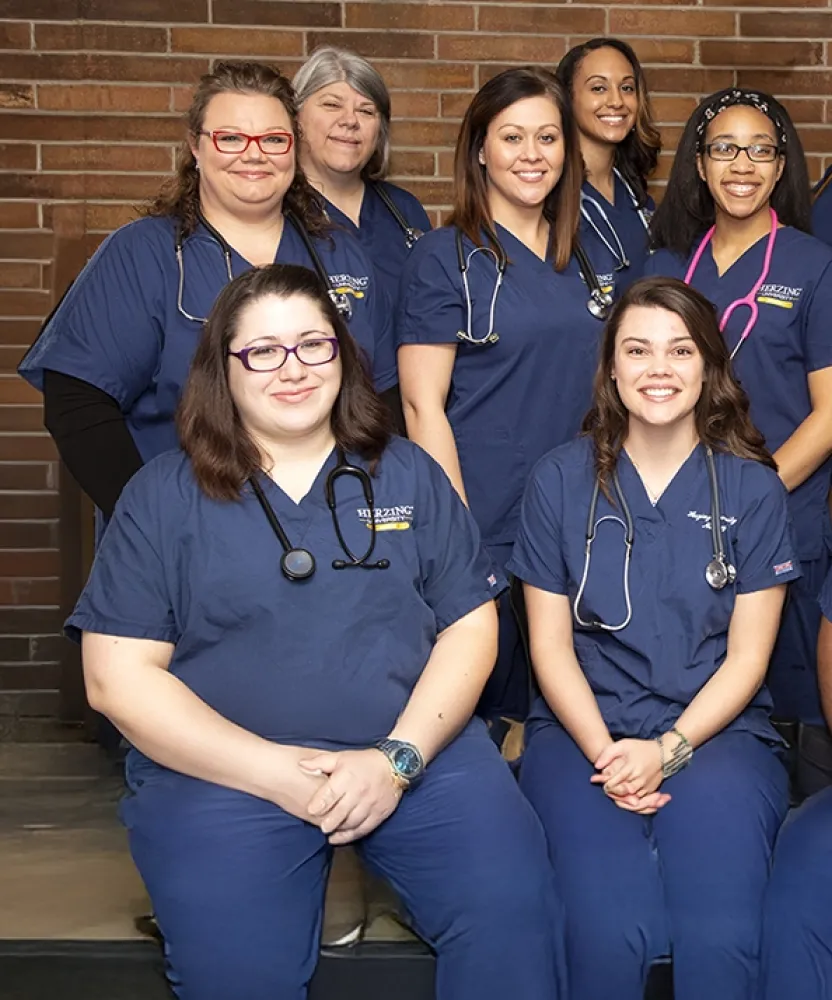Earn a nursing degree and become possible
| Accreditation | ACEN accredited,1 Accredited by the Higher Learning Commission |
|---|---|
| Transfer credit | Up to 52 approved credits |
| Format | Take classes on-campus in Tampa, FL + online |
| QuickPaths | Faster ASN Bridge pathways for LPNs, paramedics, CVTs, RTs, and military medics; degree pathways to continue your education (BSN,MSN) |
Learn More Today!
Associate of Science in Nursing (ASN) - Tampa
The Associate of Science in Nursing degree is a 2-year 72-credit program which prepares you for a career as a Registered Nurse (RN). The Tampa ASN program provides students with fundamental knowledge and skills in health assessment, med-surgical nursing, family nursing, pharmacology, and much more.
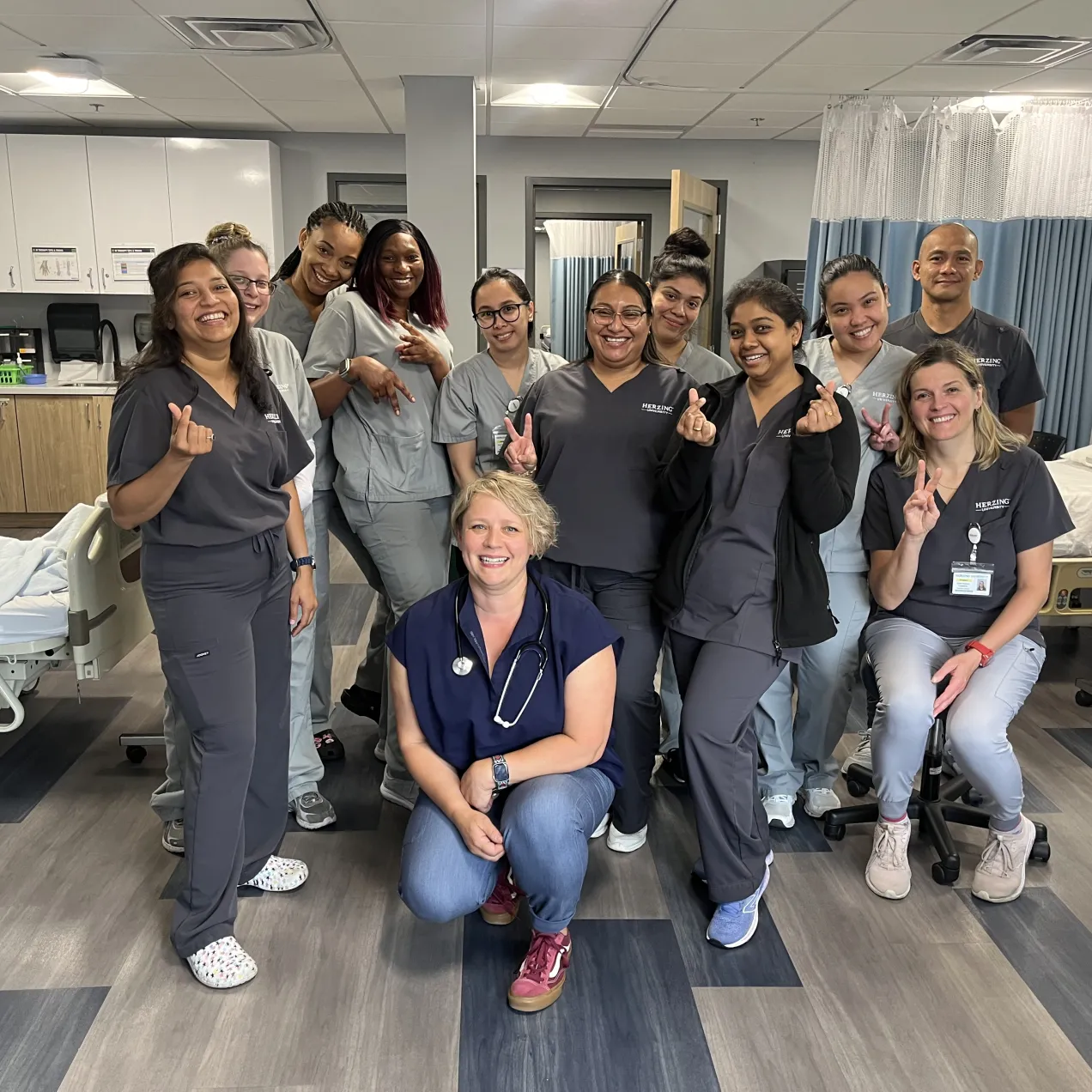
Career-focused curriculum
Discover the crucial knowledge and skills required to succeed in your work and build a foundation for continued career growth.
Flexible schedule
We work hard to help you maintain school-life balance, striving to be as flexible as possible for busy non-traditional students.
Virtual services
Access to extensive virtual services, including academic advising, tutoring, support services, technical support and library services.
Lifelong support
We support your ongoing career advancement by providing comprehensive, personalized student services with lifelong career coaching.
Rolling admissions
No application deadlines to worry about. Apply when you’re ready and prepare to get started soon.
Tampa ASN/ADN program classes & curriculum details
Required coursework for the program includes nursing support courses in healthcare and science, hands-on clinical and laboratory training, general education classes (yes, gen eds are important!), and personal and professional development courses.
Can I take any courses online? Yes, you may complete general education courses online. However, your required nursing classes must be completed on campus in Tampa, as there is crucial hands-on instructional training necessary to help you become a registered nurse.
| Program | Months i | Credits |
|---|---|---|
| Associate of Science in Nursing | 24 | 72 |
i. Average number of months for students to complete program
Required Courses in Nursing
All courses, 44.00 semester credit hours, are required.
Required Courses in General Education
Students enrolled in this associate degree program must complete a minimum of 26.00 semester credit hours. 6.00 Semester Credit Hours in Communications EN 104 English Composition I EN 111 Information Literacy 3.00 Semester Credit Hours in Humanities HU 140 Cultural Diversity 3.00 Semester Credit Hours in Mathematics MA 109 College Algebra 3.00 Semester Credit Hours in Behavioral Science PS 105 Developmental Psychology 11.00 Semester Credit Hours in Science SC 154 Anatomy and Physiology I for Nurses SC 166 Microbiology SC 254 Anatomy and Physiology II for Nurses Courses transferred from other accredited colleges may also be used to meet these requirements. Science courses being transferred from other accredited colleges must meet the nursing program science requirements.
Special General Education Grading Requirements
The following general education courses must be completed with a grade of "C" (70%) or better for a student to continue in the nursing program. MA 109 College Algebra PS 105 Developmental Psychology SC 166 Microbiology The following science courses must be completed with a grade of "B" (80%) or better. Only two attempts are permitted for each course and a student who fails to successfully complete in the maximum attempts is subject to dismissal from the nursing program. SC 154 Anatomy and Physiology I for Nurses SC 254 Anatomy and Physiology II for Nurses A student who is dropped from the nursing program for failing to achieve the minimum grade specified in the courses listed above, but who otherwise meets the academic standards of the University may transfer to another Herzing degree program and/or may appeal to reapply to the ASN nursing program in a future semester.
Personal and Professional Development Courses
2.00 semester credit hours are required.
Resuming students should refer to the section on re-entering for additional requirements.
Distribution of Contact Hours by Course
Distribution of Contact Hours by Course Course or Category Lecture Lab Clinical Total Contact Hours Credits NSG 121 30.00 30.00 0.00 60.00 3.00 NSG 122 45.00 30.00 45.00 120.00 5.00 NSG 123 45.00 0.00 135.00 180.00 6.00 NSG 124 45.00 0.00 0.00 45.00 3.00 NSG 221 45.00 0.00 45.00 90.00 4.00 NSG 222 60.00 0.00 90.00 150.00 6.00 NSG 223 60.00 0.00 90.00 150.00 6.00 NSG 233 45.00 30.00 45.00 120.00 5.00 NSG 291 15.00 0.00 90.00 105.00 2.00 NSG 298 45.00 0.00 0.00 45.00 2.00 SC 154 45.00 30.00 0.00 75.00 4.00 SC 254 45.00 30.00 0.00 75.00 4.00 SC 166 30.00 30.00 0.00 60.00 3.00 Communication 90.00 0.00 0.00 90.00 6.00 Humanities 45.00 0.00 0.00 45.00 3.00 Mathematics 45.00 0.00 0.00 45.00 3.00 Social or Behavioral Science 45.00 0.00 0.00 45.00 3.00 PD 121 15.00 0.00 0.00 15.00 1.00 PD 202 15.00 0.00 0.00 15.00 1.00 Totals 810.00 180.00 540.00 1530.00 72.00
Enrollment requirements
To be considered for admission into the ASN program, you must hold a high school diploma or equivalent (Diploma, HSED or GED) and meet the following criteria based on your cumulative GPA:
| Cumulative GPAi | Science Requirement | TEASii |
|---|---|---|
| 3.50–4.00 | None | None |
| 3.00–3.49 | 3.00 GPA in college scienceiii | None |
| 2.50 and higher | None | Composite TEAS of 58 |
i. Students with 18 or more transferable collegiate credits will be assessed on their collegiate cumulative GPA. Otherwise, the high school GPA will be used.
ii. The Test of Essential Academic Skills (TEAS) from the Assessment Technology Institute (ATI).
iii. Based on your cumulative GPA in these college science courses: Anatomy & Physiology I and II, Biology, Chemistry, and Microbiology. Two of these courses must be used to calculate science GPA. Any of these courses completed must be included in the calculation, and no others. If you do not meet this requirement, you must score a composite score of 58 or higher on the TEAS. A grade of "B" or better must be earned for transfer credit to be awarded for Anatomy & Physiology, regardless of whether it was included in the calculation.
Waived Enrollment Fee
Discover the educational pathway designed to maximize your career potential. Reach for greater heights with Herzing University.
Earning your associate degree is the first step to becoming an RN
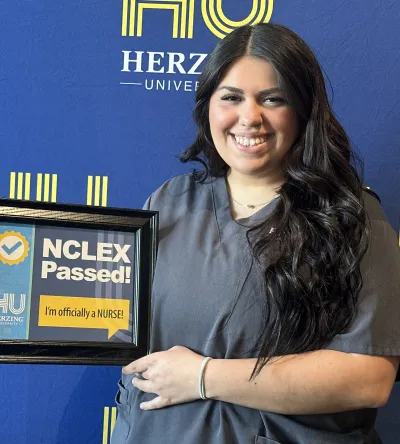


Getting an associate’s degree in nursing (sometimes referred to as ADN or ASN) qualifies you to take the NCLEX-RN exam and become a registered nurse. Registered nurses with associate degrees are in demand from healthcare organizations throughout the U.S.
Registered nurses are the backbone of the day-to-day operations in many different types of healthcare settings. You’ll wear a lot of hats and be expected to handle a wide variety of tasks, including:
- Develop and direct treatment plans
- Communicate with patients and family members
- Perform diagnostic tests
- Operate medical equipment
- Serve as the key connection between patients and doctors
RN’s may specialize in many different areas, including pediatrics, neonatal/NICU, surgical/OR, geriatrics, OBGYN, ER, trauma and more.
We offer degree pathways to help you reach as high as you want to climb in the field of nursing.
Salary and job outlook
According to the Bureau of Labor Statistics, employment of registered nurses is expected to rise 6% from 2022-2032, and their average salary is $94,480 per year ($45.42 per hour).*
Now is a great time to begin earning the education you need to find a great job in healthcare, build a foundation for career growth and make an impact in your community.
Faq
Frequently Asked Questions
Didn't find the answer to your question? Send us an inquiry and we will be happy to answer all your questions!
The biggest difference between a diploma in nursing and an associate degree nursing program is that students in an associate degree program take college courses, and students in a diploma program do not. Earning a practical nursing diploma takes less time than an associate degree (our program can be completed in as few as 12 months). Associate degree programs can take around 2 years to complete and prepare students for licensure as a registered nurse.
The advantage of an associate degree program is you can qualify to become an RN and get a head start on further education—your college course credit can potentially transfer into an online RN to BSN or RN to MSN program should you choose to advance your education in the future.
The advantage of a diploma program is you can get starting working in nursing faster as an LPN (Licensed Practical Nurse) and more quickly discover if nursing is the right career for you.
Herzing University wants to empower you to reach your educational goals. We can help you earn an associate’s degree which is the first step to becoming a registered nurse. Give us a call at 800-596-0724 or request for more information to begin your new career.
With Herzing University you are never alone. It’s our goal to provide all students an affordable, career-driven education. Financial aid options include:
- Loan options – Federal & private
- Scholarships & grants
- VA / military benefits
- Other sources of financial aid
You can find an estimate for tuition and expenses by using the Herzing University tuition wizard.
It’s a question of:
- What your goals are
- How quickly you want to reach them
If your goal is to go from LPN to RN quickly, the best choice may be an associate’s degree program since you may be able to become an RN in less than 2 years.
If your goal is to become an RN and potentially advance further by working towards a master’s degree in nursing (MSN), your best option is a bachelor’s degree in nursing program.
Read about the most basic differences between ADN vs. BSN and discover what's best for you.
Yes. Demand remains extremely high for all registered nurses, and if you earn an associate degree, pass the NCLEX and meet the board of nursing requirements in your state, you’re one of them.
Nurses with bachelor’s degrees may have an advantage in earning a nursing position at a hospital (especially hospitals seeking Magnet status), but nurses are currently in such high demand many healthcare organizations are eager to hire ASN nurses.
We offer online associate, bachelor's, and master's degree pathways for those without nursing experience looking to become an RN. Eligibility varies by state of residence.
Learn more about our online nursing programs designed for non-nurses.
Because nurses with a BSN have earned that next degree level and generally have the edge on the job market, they will on average earn a slightly higher salary than nurses with an ASN. However, there are always exceptions; an ASN with several years of an experience may earn a higher salary than an RN with a BSN who is just starting their career.
- ASN: Associate of Science in Nursing
- ADN: Associate Degree in Nursing
- AASN: Associate of Applied Science in Nursing
For the purposes of being eligible for the NCLEX exam and becoming a registered nurse, there isn’t much of a difference between these types of degrees.
In general, higher education institutions determine the terminology to use based on the nature of their program and what they emphasize as a priority.
As a career-focused organization, Herzing University stresses the importance of real, engaging coursework to prepare you for a job in the field—so we offer an Associates of Science in Nursing (ASN) at our Birmingham, Nashville, Orlando, and Tampa campuses, and our Akron campus offers an Associates of Applied Science in Nursing (AASN).
We also offer an online associate in nursing program for residents of select U.S. states.
Compare ADN vs. BSN and discover the difference between the two undergraduate degree paths for nurses.
The Student Experience at Herzing
When I got to Herzing it was like having a real-life family. They truly care about their students. If you’re willing to put in the work, study and really go the extra mile for your education, then nursing is the field for you.
Holly Bell
Nursing Student | Birmingham CampusAs a grad, my next step will be working as a PCU nurse. I also plan on continuing my education in the future!
Emilda Desir
Nursing Student | Orlando CampusI saw how my job helped others and I decided it was time to challenge myself and take on more responsibilities. It was a challenge I was ready for.
Lori Mathes
Nursing StudentFor as long as I can remember, I wanted to work in the medical field.
Ashley Ramirez
Nursing Student | Orlando CampusIf you can handle the fast-paced courses, then pursuing an associate's degree is the best path.
Ben Courson
Nursing Student | Akron CampusI was so much more confident in my interviewing abilities because of the amazing people, the professors, the other students, and the entire career center.
Fabio and Felicia Giraldo
Nursing Student | Orlando CampusAccreditations & Disclosures
Associate of Science in Nursing: The Associate of Science in Nursing program at the Tampa location has an approval status with the Florida Board of Nursing (4042 Bald Cypress Way, Tallahassee, Florida, 32399-3252, 850-245-4125, (www.floridasnursing.gov). Consequently, graduates are eligible to sit for the National Council of State Boards of Nursing (NCLEX-RN) licensing exam upon successful completion of the program. Passing this exam allows graduates to apply to the State Board of Nursing for licensure as a registered nurse.
The associate nursing program at Herzing University at the Tampa Campus located in Tampa, Florida is accredited by the:Accreditation Commission for Education in Nursing (ACEN)
3390 Peachtree Road NE, Suite 1400, Atlanta, GA 30326
404-975-5000The most recent accreditation decision made by the ACEN Board of Commissioners for the associate nursing program is Initial Accreditation.
View the public information disclosed by the ACEN regarding this program on the ACEN website.
To review the end-of-program student learning outcomes, please click the Handbook above or see the Program Outline in Herzing University Undergraduate catalog at https://www.herzing.edu/catalogs.
Herzing University is accredited by the Higher Learning Commission (hlcommission.org), an institutional accreditation agency recognized by the U.S. Department of Education.
| Program | 2024 Completion Ratei | 2024 NCLEX-RN/NCLEX-PN Pass Rateii |
|---|---|---|
| Akron Campus: Associate of Science in Nursing | 40.7% | 87.50% |
| Birmingham Campus: Practical Nursing | 14.2% | 100% |
| Birmingham Campus: Associate of Science in Nursing | 35.1% | 95.31% |
| Brookfield Campus: Practical Nursing | 21.5% | 84.31% |
| Kenosha Campus: Practical Nursing | 18.2% | 81.63% |
| Orlando Campus: Practical Nursing | 29.3% | 95.65% |
| Orlando Campus: Associate of Science in Nursing | 53.2% | 80.71% |
| Tampa Campus: Practical Nursing | 11.8% | 100% |
| Tampa Campus: Associate of Science in Nursing | 45.3% | 70.97% |
iProgram Completion Rate calculation for students who complete the program of study on-time begins with calculating enrollment on the first day of the first nursing course and ends with completion of course required for conferral of the degree. Data presented is in the aggregate for students who started the program in 2022.
iiNCLEX Pass Rate is based on first time exam takers from January 1, 2024 through December 31, 2024.
*Official Data is still under review by NCSBN.
* Bureau of Labor Statistics (BLS), U.S. Department of Labor, Occupational Employment and Wage Statistics 2023 / Occupational Outlook Handbook 2022. BLS estimates do not represent entry-level wages and/or salaries. Multiple factors, including prior experience, age, geography market in which you want to work and degree field, will affect career outcomes and earnings. Herzing neither represents that its graduates will earn the average salaries calculated by BLS for a particular job nor guarantees that graduation from its program will result in a job, promotion, salary increase or other career growth.
Recent Blog Posts
Waived Enrollment Fee
Discover the educational pathway designed to maximize your career potential. Reach for greater heights with Herzing University.



